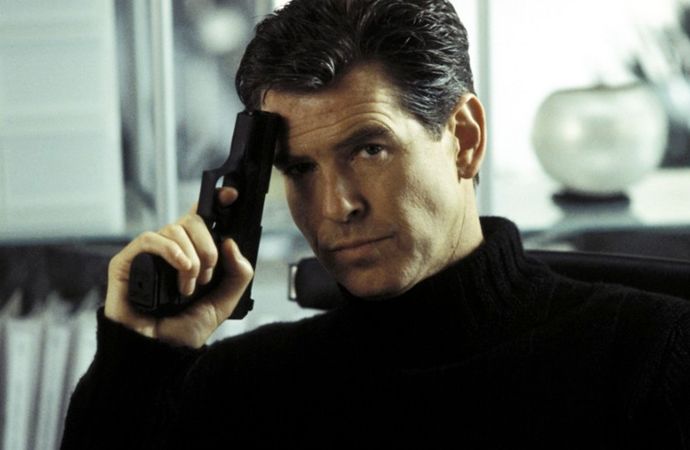
Betrayal is a recurring subject throughout the James Bond films of the Pierce Brosnan era. In the 1995 blockbuster GoldenEye, Bond suffers the treason of his friend agent 006, who fakes his death and resurfaces as an arms dealer in Russia to plot a macabre revenge against Britain. Tomorrow Never Dies, from 1997, is a major exception as all the character’s intentions are pretty much dealt from the early minutes of the film; but 1999’s The World Is Not Enough has 007 almost falling in love for a pretty oil heiress and former kidnap victim ignoring that the man who is supposedly after her is a mere accomplice in a plot that involves a massive revenge against Bond, MI6 and her leader M. Enter the 21st century in 2002 and Miranda Frost’s betrayal costs Britain’s ace of spies an uncomfortable stay in a North Korean military prison and posterior banishment from the British Intelligence in Die Another Day.
The betrayals to Brosnan’s Bond, unfortunately, would continue after the cameras stopped rolling.
Receiving the “Billion Dollar Bond” moniker in 2000 after MGM announced that the worldwide box office takings of GoldenEye, Tomorrow Never Dies and The World Is Not Enough totaled $1,046,000,007 plus the $431 million gross of Die Another Day, there was no doubt about the commercial success of the fifth Bond actor. Many felt that Brosnan deserved another Bond adventure and the Irish star has several times his desire to return for a fifth film. Regrettably, this didn’t happen as a change of plans led to the reboot of the saga with Casino Royale in 2006. Learning that he was axed from the role was painful both for the actor as for his fans. But the fact that his exit was so indecorous –and disrespectful– makes the whole affair feel like an undeserved injustice. The man who resurfaced the character in a time where he was considered a relic of the Cold War deserved a better farewell.
When looking at his final film Die Another Day, much of the blame is projected on the excessive profusion of special effects. This is often made a synecdoche of the whole film in revisionist reviews that ignore the context of the times: the early 2000s, where exaggerated stunts and situations convened with strong violence in a world shocked by terrorist attacks of September 11, 2001, which had a major influence in the entertainment industry. But while outlets have taken into account the excess of CGI and not-so realistic situations in the 2002 movie, the Lee Tamahori film also had a fair share of appraisal: chief among them was Entertainment Weekly’s Owen Gleiberman, who had been very critical of Pierce Brosnan’s debut in GoldenEye yet ended up celebrating the way Die Another Day put the fate of the character at stake with Bond’s torture, imprisonment and dismissal from MI6 before he cleans his name. Alexander Walker, from the Evening Standard, also gave the film an interestingly positive review for a man who rarely regarded commercial features so highly.
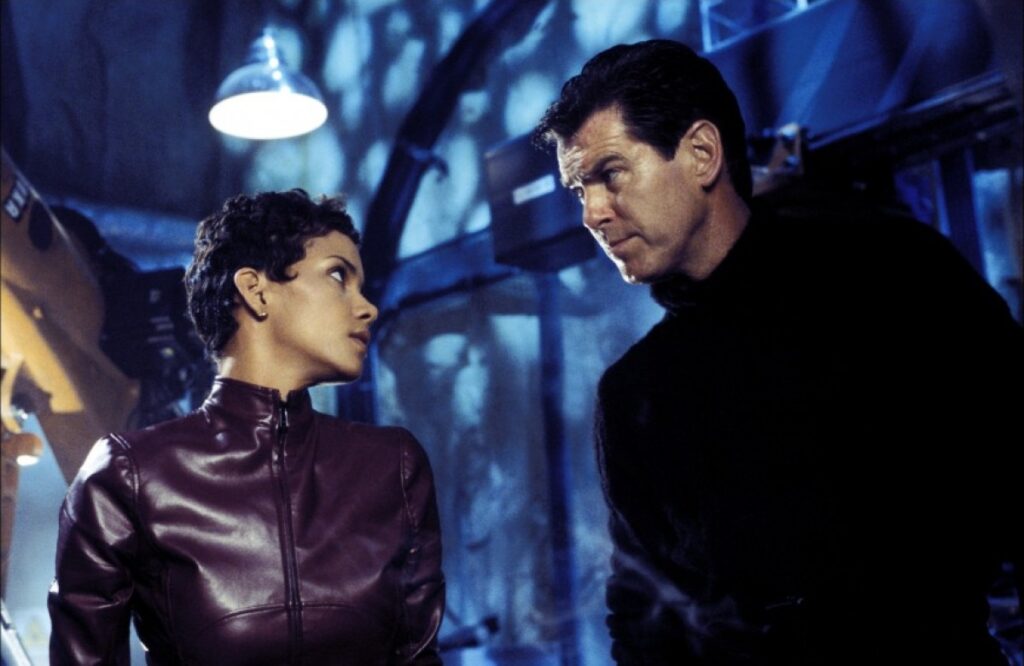
Furthermore, MGM had been very pleased with the numbers of the film: at $160 million, it represented the 42% of their income in the domestic market. Inflation-adjusted ($298 m), it had a better performance than every following EON film bar Skyfall in the United States and Canada. For MGM’s Vice-president Chris McGurk, Die Another Day had “the winning formula” and that formula would play a part in the film that would eventually be Casino Royale. This way, 2003 was riddled with rumors of an (eventually cancelled) spin-off starring Halle Berry as Die Another Day’s NSA agent Jinx, the announcement of Electronic Arts’ video game Everything or Nothing counting with Pierce Brosnan’s voice and appearance, and the names like Clive Owen and Jude Law popping up as possible next James Bond. Needless to say, few fans considered the idea of Brosnan’s exit seriously back then. And those who had been very critical of the style of his fourth film even hoped that he would have the chance to do a less spectacular adventure as it had happened to Roger Moore with For Your Eyes Only after Moonraker.
In March 2004, rumors of Brosnan’s departure of the role increased when he gave ambiguous words concerning his return as 007: “I don’t know. We’re in a very opaque land at the moment. I’m certainly willing to come back for a fifth and final one. But I think with the producers a certain kind of paralysis has set in. And they don’t know where to go, how to go with this film. So if it happens, great. If it doesn’t, I’ve done my four.” During this period, there were reports of Neal Purvis and Robert Wade having completing the script for the 21st Bond film, but tailored for a “generic Bond actor”, although more pessimistic insiders would say the project was “in development hell”.
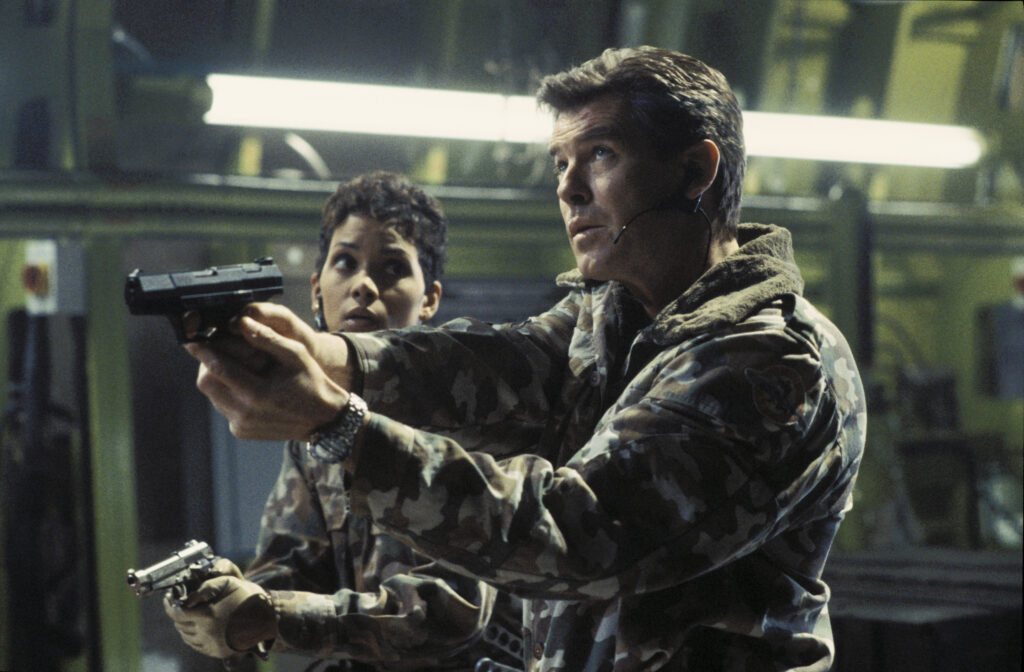
During press junkets for The Laws of Attraction, where he co-starred opposite Julianne Moore, Brosnan kept saying that he didn’t have a concrete answer regarding his return as 007 and showed his discontent towards the producers: “They said they wanted to do a fifth, and we started negotiations, and those negotiations have now ceased. Where does that leave me? How do I answer this question? It would be nice to have it on level ground. But nobody knows. I wish I could be more specific and say, ‘No, they’re going to look for somebody else. My time is up; they’ve found somebody else.’ I can’t say that, and at the same time I can’t say, ‘Well, we’re going ahead,’ because they said, ‘We don’t have the script. We don’t know what to do.’”
On October 14, 2004, as he shot After The Sunset in the Bahamas, the Irish actor said his time as James Bond was “absolutely over”. According to his version, he was phoned by the producers and was told they were looking for someone else: “They invited me back right before I went to present that film (Die Another Day). They said: ‘We’re so happy with the success, we want you to come back!’ And then one day the phone rang. I was here and my agents told me that the goalposts had moved and that they had changed their minds.”
But what happened on the other side, before Brosnan got his burn notice? Much of the debate to whether to renew the actor’s contract or not were related to his age, as he had turned 50 six months after the release of Die Another Day. Michael Nathanson, former president of MGM Pictures, told The San Francisco Experience podcast that he and his partners at MGM felt they could get at least one more movie from Brosnan and so did producers Michael G Wilson and Barbara Broccoli. One morning, Nathanson got a call from Broccoli and said she was going to have breakfast with Brosnan in Los Angeles to tell him he was out of the picture. She didn’t have another candidate in mind to replace him and even though the MGM executive told her that the actor was expecting something different, she seemed to have made up her mind. Hours later, Nathanson’s phone was inundated with calls from Brosnan’s agent, Fred Spector, who was trying to reach him and his partners Alex Yemenidjian and Chris McGurk. “Pierce was shattered. He had absolutely no expectation about it, and he felt somewhat betrayed by them based on what they had said before this,” he explained.
To put these feelings into context, we shouldn’t forget that Pierce Brosnan’s connections to James Bond go beyond just playing the character: his late wife, Cassandra Harris, had a small role in For Your Eyes Only and she herself hoped to see her husband playing 007. Unfortunately, she had died of ovarian cancer in December 1991, slightly less than four years before GoldenEye premiered. In his early childhood and just arrived to London from Ireland, Brosnan’s first Technicolor experience on the big screen was Goldfinger, the third film in the EON series. Precisely, the day the 11-year-old Pierce was on the plane heading for London was August 12, 1964, when a heart attack ended the short but fascinating life of Ian Fleming. On top of this, as is well-known by now, Brosnan was first cast as 007 in 1986 as Remington Steele was facing cancellation. This opportunity was frustrated by the NBC when they decided to renew the series co-starring Stephanie Zimbalist and used a clause in the actor’s contract to hold him in the role of the anonymous thief-turned-detective.
For Chris McGurk, Brosnan’s axing was centered on a discussion about money. It appears Wilson and Broccoli had rejected his salary demands, which according to some outlets were exorbitant. This rumour was denied by the fifth Bond in October 2005 claiming that it was more or less the same amount men and women have received for starring in similar blockbusters. The former MGM Vice-president places the meeting between Brosnan and the producers at lunchtime in a restaurant in Santa Monica and claimed that the actor wanted a satisfactory explanation on why they weren’t renewing his contract and the subject of his fee was brought up. It is understood that the producers said “No”, there were no appeals and Brosnan simply got up and walked away of the restaurant.
Unlike the two MGM executives, the actor didn’t mention a meal with the producers, only a phone call.
That’s show business for you, as that episode from The Simpsons titled “Bart Gets Famous” reminds us. But beyond the speculation of businessmen (or women) handling intellectual properties and taking difficult decisions in the world of entertainment, perhaps the biggest betrayal Pierce Brosnan has suffered in the past decades –and only barely mended recently– comes from moviegoers complying with revisionist ideas concerning the James Bond saga, whose starting point was entered the reboot cycle in 2006.
Contradicting Ian Fleming’s statement that his Bond novels were not written for “a suffering humanity”, the Daniel Craig era exacerbated the character’s weaknesses and questioned the character’s antics film after film, leaving our hero in a position where he was equaled to the villain and repeatedly described as an “assassin” by people who –unlike Bond– would have no remorse in hurting innocents or destroying nations with a nuclear strike. The character himself describes his duty as “killing people” and Spectre’s leading lady (played by Léa Seydoux) wonders why “did he choose the life of a paid assassin”. It’s not just that the villains are saying it, the hero describes himself that way.
This revisionist take on James Bond made the original era the target of different complains, from signaling Sean Connery’s machismo to the excess of comic gags in the days of Roger Moore. In the case of Pierce Brosnan, the disapproval is directed to the perception that he wasn’t physically strong, that the scripts of his films were bland and with uninteresting villains, or that his women were mere decorative elements.
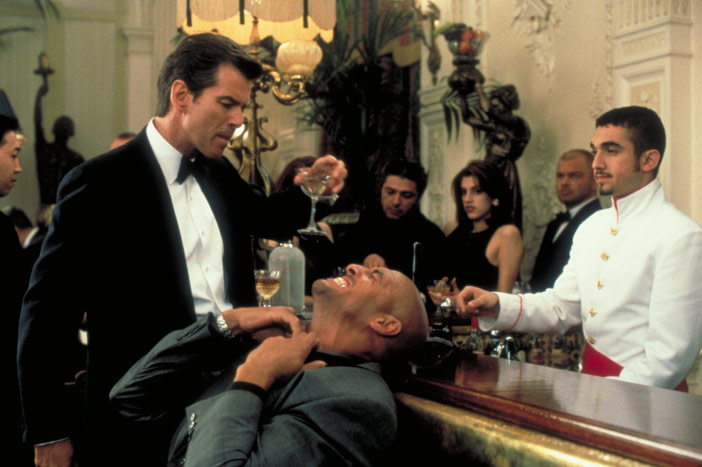
These accusations are not fair. While Brosnan didn’t have the body of a bodybuilder, he knew how to kill or incapacitate an enemy with his bare hands. There is plenty of physicality in his confrontation with Alec Trevelyan at the end of GoldenEye and he can subdue with a few quick moves three armed bodyguards at a banker’s office in The World Is Not Enough, too. Another good example of his dark side takes place in Die Another Day, where he grabs the drips feeding into Zao as he lays unconscious in a Cuban clinic and forces him to give away the identity of a traitor inside MI6: “Got you attention!” he sardonically says as the terrorist is in deep pain. As charming as his Bond was, he could also be though when he wanted to and cold-hearted enough to shoot a woman he loved when she turned on him, showing that for him his loyalty to Queen and Country always comes first.
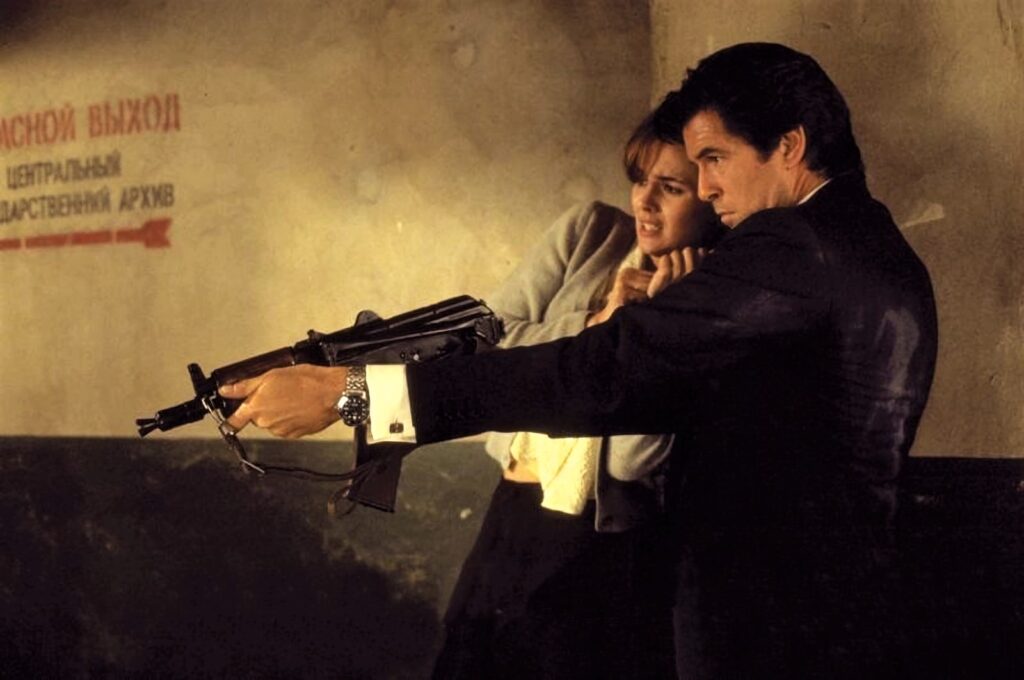
These films offered interesting challenges for Ian Fleming’s secret agent to face during the transition of two centuries: GoldenEye faced Bond off against another 00 agent, which underlined how dangerous these men could be when switching sides and how much a solitary man like Bond trusted in him – he even knew how his parents died (a fact taken from Ian Fleming’s You Only Live Twice and first acknowledged by EON on that film) and how he suffered “for those women he failed to protect”, a notable reference to his wife Tracy killed at the end of On Her Majesty’s Secret Service. More importantly, the script constantly places Bond in a world that rejects him only to have him prove with actions, not words, that he is the only man we can depend on. Like Austin Powers, he isn’t fully adapted to the 1990s, but unlike Powers he is skilled and competent enough to handle modern technologies like an IMB laptop and is up to date with information regarding the Russian fail-safe systems or the dangers of an electro-magnetic pulse.
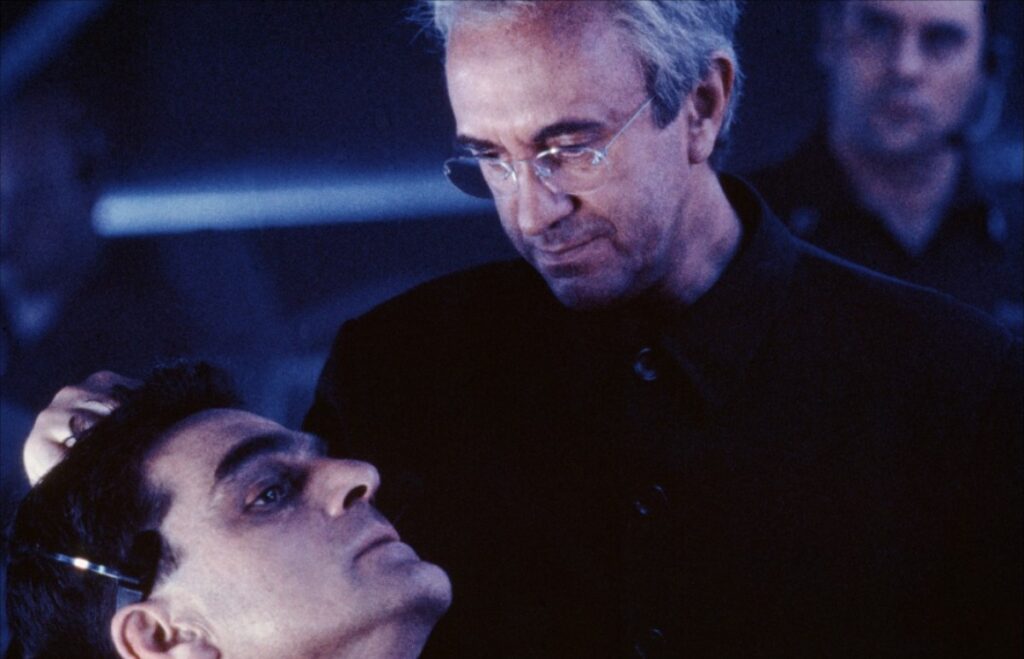
The most by-the-book chapter of this cycle is Tomorrow Never Dies, based on the typical “world domination through World War III” seen in You Only Live Twice and The Spy Who Loved Me. All the cards are dealt at the beginning and there are no surprises regarding who are the heroes and the villains in the story. But while it didn’t present major changes in terms of narrative structures, the film made a case for the dangers of telecommunications in a hyper-globalized society. Some six years after of CNN’s bombastic 24-hour coverage of Gulf War, the second Pierce Brosnan 007 adventure presents us with a media mogul who compares his media empire to Caesar’s legions and Napoleon’s armies and pits the United Kingdom and China against each other by tampering their navigation devices. When we see how world leaders and ministers often fight media outlets on social media and even users dedicate to uncover apparent interests in these corporations than go beyond reporting the news as objectively and faithfully as possible in the past years, we can confirm that the Roger Spottiswoode film was definitely ahead of its time.
The World Is Not Enough marked the tone for the Bond films to follow: character-driven stories and enemies from the past making a comeback to spoil the party. M, who did little more than sitting behind the chair and giving orders, would be directly linked to the leading lady of the film, the daughter of an oil tycoon killed in an explosion inside MI6 who was a close friend of her. Far from her tough as nails attitude in GoldenEye, we see how her maternal instinct makes her put herself in danger and take Bond’s intervention one step further when his own investigations conclude it was her who plotted the death of her father with the terrorist who kidnapped years ago. Played by Sophie Marceau, Elektra King wasn’t another femme fatale type of villain, but someone who believed in her own cause and who was trying to vindicate the image of her Muslim mother, whom she considered the true owner of her father’s fortune. The film ponders an interesting view on the murky areas on entrepreneurship as Bond himself questions the “integrity” of M’s friend when he learns he spent millions buying classified reports on the black market. Brosnan’s relationship with this lady is intense and he attaches himself emotionally when he knows she is in danger, in a way that comes as a surprise to himself and the audience when we learn she is a cold, calculating and manipulative woman who used both 007 and the apparent main villain for her own ends.
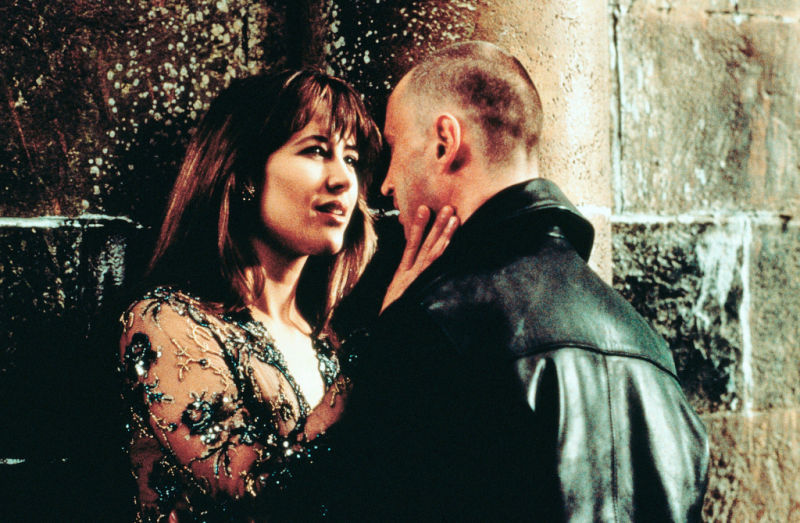
The terrorist attacks of 9/11 provoked fear not only across the United States but in the rest of America and primarily the West. Places that were perceived as “safe” weren’t safe anymore. This feeling is echoed in Die Another Day right from the pre-credit sequence, where an MI6 traitor tips the North Korean villain off of Bond’s cover and the secret agent is, unexpectedly, captured and tortured in a military prison. Bond is eventually exchanged and freed, but abandoned by his own people. The Americans, taking the lead on the War on Terror, determine 007 might have hemorrhaged information during the scorpion-based torture and M is forced to suspend him from the Double-0 section. Ian Fleming’s theory that espionage is a dirty trade often romanticized by the people is perfectly exemplified in the 2002 film, where spies –unlike soldiers– are treated as replaceable government assets than heroes whose lives have a weight in the public opinion. There is much debate about the proliferations of gadgets in the film, but people forget that Bond spends over 20 minutes of the film without government support and with nothing more than a heavy Smith & Wesson revolver and a 1957 Ford Fairlane car. Later in the film, where people argue that the special effects and unrealistic situations take control of the story, the secret agent drives a brand new Aston Martin V12 Vanquish loaded with gadgets. However, this special equipment hardly makes a difference when he has to confront the villain’s sidekick Zao, owner of an equally-deadly car. In the end, and by specifications given by director Lee Tamahori, it is not the car which grants Bond’s victory (as it had happened many times in the past) but his driving skills over his enemy’s.
Perhaps the major proof of how relevant the scripts for these films were is that key elements were reworked into the reboot era: Skyfall takes major elements from The World Is Not Enough (M threatened by someone from her past and the MI6 Headquarters attacked, to name a few) just like difficult relationship between Bond and M in Die Another Day sets a precedent for a similar dynamic of the two in Quantum of Solace. The destruction of Britannia statues and iconography of classic Bond elements during the main title sequence of No Time To Die seems to emulate the way Soviet statues were torn down in the GoldenEye main titles, the same idea to reflect two completely opposite worldviews.
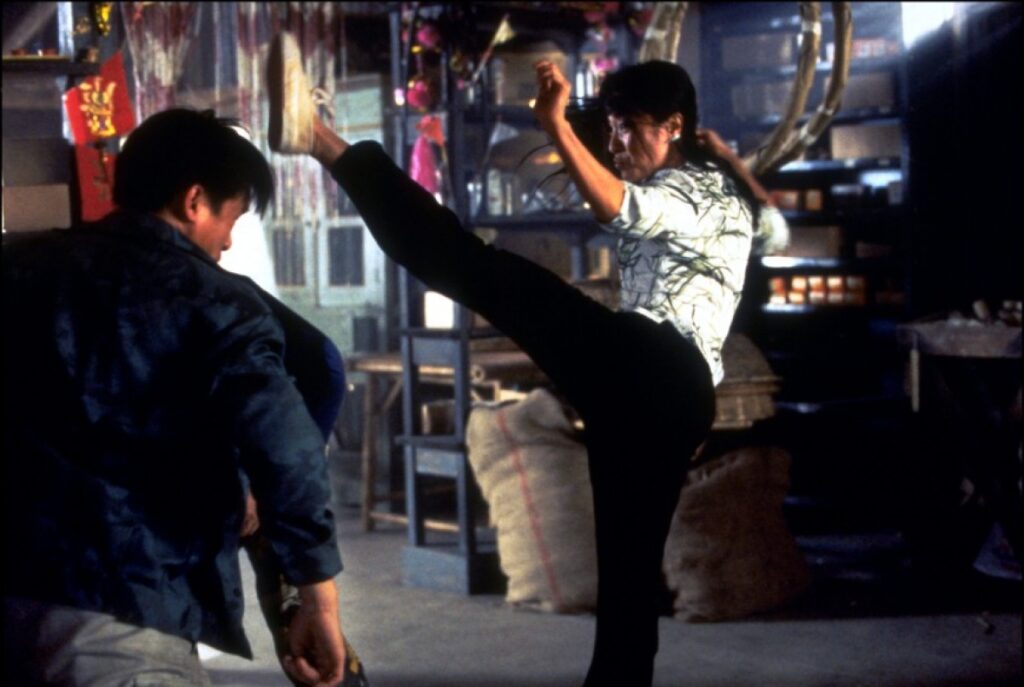
Brosnan’s female companions provided the perfect combination of beauty and brains. In GoldenEye, Famke Janssen gave the series the first actual sex scene and provided the first sexually arousing moments after the lack of eroticism in the short Timothy Dalton era, but Izabella Scorupco broke new ground by actually questioning Bond about his life and how he felt about the coldness of his profession (another characteristic beaten down like a dead horse during the reboot era); Michelle Yeoh, now an Oscar winner thanks to Everything, Everywhere All At Once, proved to be capable Chinese agent who resisted Bond’s charms until the very end and even pushed for a change in the name of her character. This character was originally named Lin Pao, and since “Pao” means bun in Chinese she suggested the name Wai Lin, as “Wai” means “Patriotic for the Country”. Denise Richards’ character Dr Christmas Jones in The World Is Not Enough often gets overshadowed by the weight Sophie Marceau’s Elektra King carries in the story and even director Michael Apted admitted that the character was there to ensure a happy ending for Bond. However, Dr Jones is far from useless and saves the life of our hero many times, not to mention she was the only one who suspected something was off when he infiltrated a nuclear plant in Kazakhstan posing as one Dr Arkov, something none of the security men in charge of the compound did. Halle Berry, who had won an Oscar as she shot Die Another Day for her work in Monster’s Ball, may have been too streetwise to be that “female Bond” the PR campaigns wanted to sell, but in any case she could defeat an Olympic fencer like Miranda Frost in her own game. The case of Rosamund Pike’s character is also interesting to analyze given her triple loyalties: an MI6 agent infiltrated at the organization of the villain Graves only to have been working all along with him, reflecting much of the spirit of Sydney Bristow, Jennifer Gardner’s character in Alias but squarely on the bad side. If GoldenEye’s Alec Trevelyan staged his death to resurface nine years later, Miranda Frost was alive and well misdirecting MI6 to clear Graves of guilt undermine Bond’s performance.
Opinions aside, the disdain for Pierce Brosnan’s portrayal of James Bond or his films back in the day was scarcely seen. Those who had studied Ian Fleming’s character for a lifetime and had bylines in important publications in the Bond subculture have even named Brosnan as the best Bond since Sean Connery and others were more positive towards The World Is Not Enough and Die Another Day than what they are today. Shortly after Brosnan was cast aside from the franchise in 2005, Christopher Lee claimed that he was the closest to Ian Fleming’s Bond. Lee not only played the title villain in 1974’s The Man With The Golden Gun, but was also a cousin of the 007 creator.
Moments like GoldenEye’s tank chase or the dogfight near the Russian border in Tomorrow Never Dies with the MiG jets are still brought up by non-Bond fans in occasional conversations. Even the three most recent entries in the Mission: Impossible saga, starring Tom Cruise and directed by Christopher McQuarrie, reference films more than anyone involved there would like to admit – although McQ himself has shown his appreciation for this era in a 2018 interview. Even Alec Baldwin’s character Alan Hunley wears one of the ties Bond has worn in Tomorrow Never Dies in a scene of Mission: Impossible – Rogue Nation, from 2015.

The finger pointing at the lack of realism in several set pieces from GoldenEye, Tomorrow Never Dies, The World Is Not Enough and particularly Die Another Day frequently appears on retrospective analysis. No movie is without sin and other Bond films have received this critique as pretty much every blockbuster outside Bond. However, a special malice is detected when the subject of unrealistic action is brought up towards this era, mainly from those considering his successor –who could unexplainably survive a sniper shot, a fall and getting drowned while being unconscious– the embodiment of realism in the whole Bond universe. Not to mention the excessive punishment towards the invisible Aston Martin Vanquish, a functionality based on something the army was working on at the time and several scientists could give the illusion of invisibility to different objects in the same way Q explains in the movie (tiny cameras projecting what is reflected on the exact opposite side of the car). And we have yet to see a fully functional submarine car as the Lotus Esprit from The Spy Who Loved Me, which was even more far-fetched in 1977 than the Vanquish in 2002.
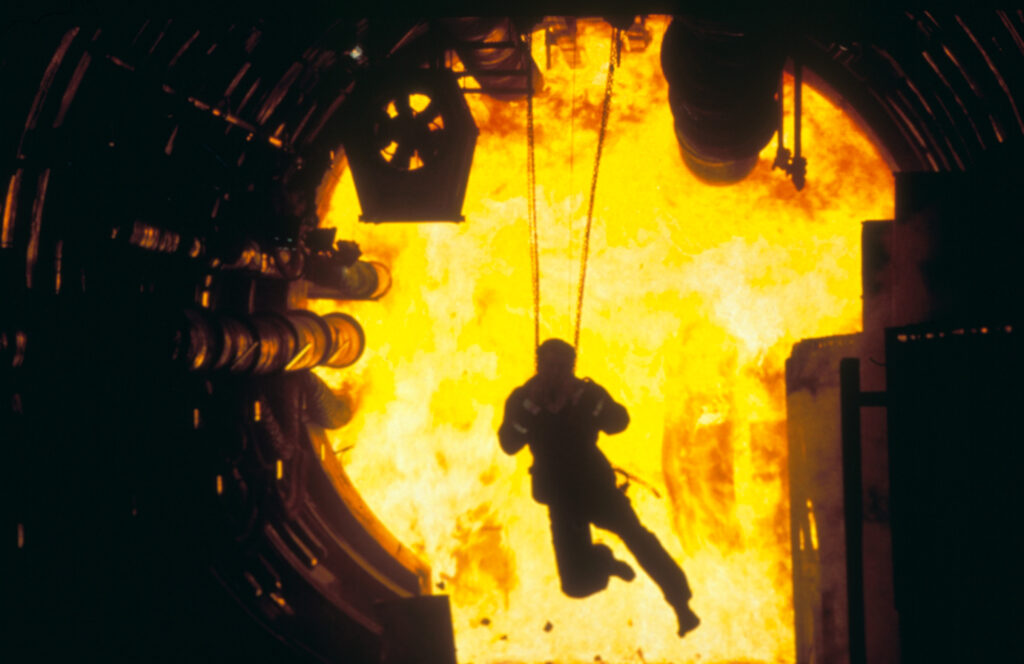
Thirty years after he was first announced to the world press as James Bond –a date even the official 007 social media accounts got wrong in numerous opportunities (it was June 8, 1994, and not June 7) – Pierce Brosnan has reconciled himself with his time as Ian Fleming’s secret agent. Despite he has at times neglected his era and complained of his famous one-liners, it only takes to see his recent film Fast Charlie to see how several of his Bond day’s antics have made into the Charlie Swift persona, one-liners included. Far from Connery’s rejection of the character after the Bondmania of the late 1960s followed him to the restroom (literally), the Irish star even took some of his time to join a GoldenEye watchalong hosted by Esquire in 2020 and even agreed to play the N64 video game of the same name with Jimmy Fallon as he promoted his 2014 film The November Man.
For a reason, however, he didn’t seem to be very much pleased with No Time To Die and, when asked about Daniel Craig’s replacement in the role, he simply stated “I don’t care”.
For those who know how that film ended, it’s not difficult to understand why.
Nicolás Suszczyk
Read more about Pierce Brosnan’s James Bond era, his departure from the role of 007 and the connections between Bond and Ethan Hunt in the Updated Edition of The Bond of The Millennium.